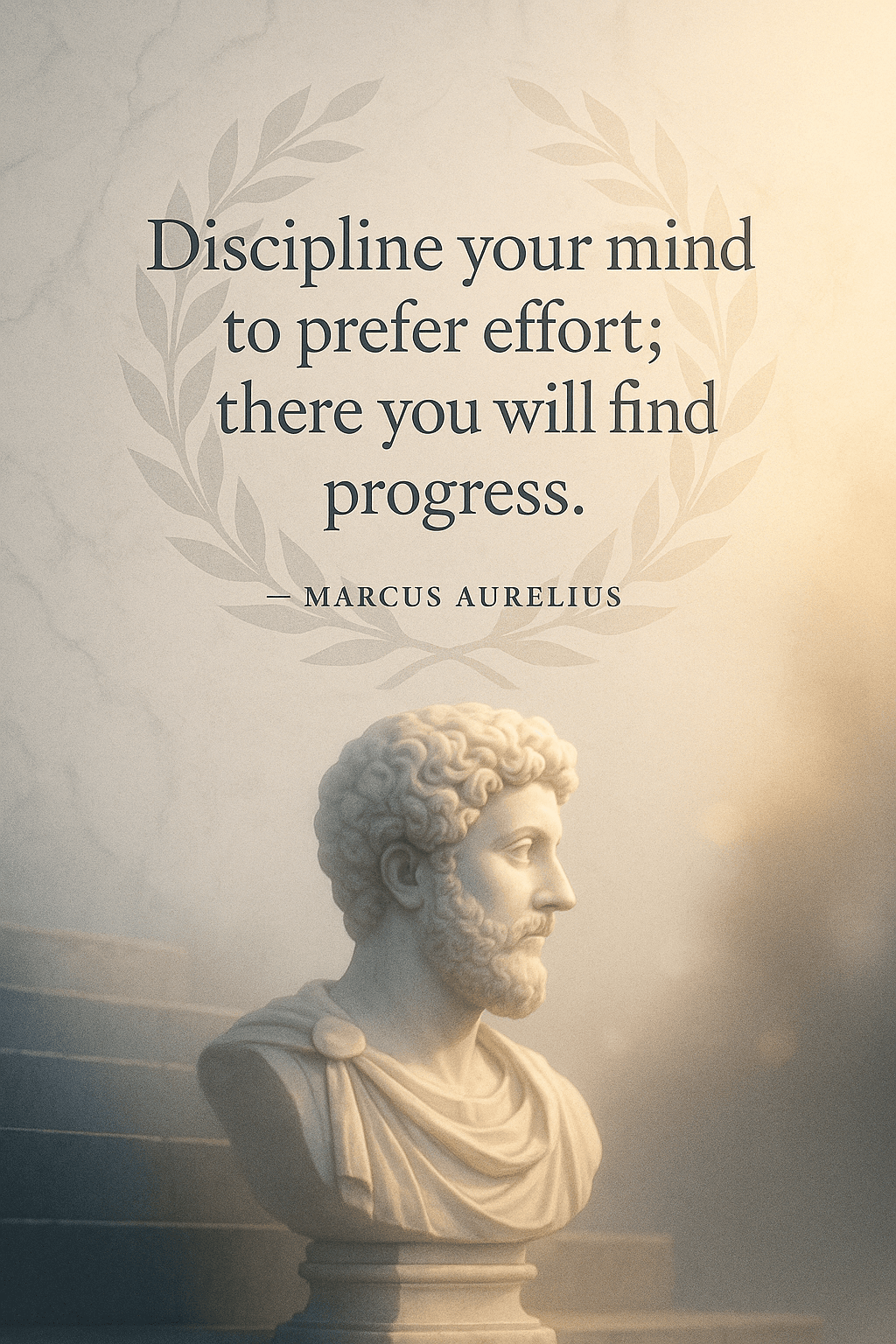Choosing Effort: The Stoic Path to Progress

Discipline your mind to prefer effort; there you will find progress. — Marcus Aurelius
The Stoic Reframing of Effort
Marcus Aurelius urges us to train the mind to seek what is hard because difficulty is the arena where virtue takes shape. Rather than treating effort as a tax on comfort, he reframes it as the price of becoming who we intend to be. In Meditations 5.1, he counsels himself at daybreak to rise to “the work of a human being,” reminding us that duty precedes mood. Seen this way, progress is not an accident of inspiration but a habit of choosing the uphill path. When attention reaches for challenge instead of ease, the mind discovers its agency, and with agency comes growth.
Training Desire, Not Just Endurance
While grit matters, Stoicism goes deeper by educating desire itself. Epictetus distinguishes what is in our control from what is not (Discourses 1.1), urging us to love the strenuous choices that refine judgment, not merely survive them. Likewise, Roman Stoics praised voluntary hardship as moral exercise—choosing the harder right to make it the easier default. Therefore, the discipline Marcus recommends is not grim asceticism; it is taste formation. By repeatedly preferring effort, we teach ourselves to want practices that enlarge us, so perseverance becomes less a battle of willpower and more an alignment of values.
Why Effort Works: Deliberate Practice
Modern skill research clarifies the mechanism behind the Stoic intuition. Anders Ericsson’s work on deliberate practice shows that improvement requires targeted, effortful stretches just beyond current ability, coupled with feedback and rest (Ericsson & Pool, Peak, 2016). Comfort stabilizes performance; only calibrated difficulty upgrades it. Moreover, a growth mindset makes those stretches tolerable. Carol Dweck’s Mindset (2006) documents that believing abilities are developable redirects attention from proving talent to improving technique. Thus, preferring effort is not masochism; it is a rational bet on the only conditions under which mastery reliably emerges.
Neural and Psychological Payoffs
Effort leaves a physical trace. Draganski et al. (2004) found that adults who learned to juggle showed gray-matter increases in motion-related regions—changes that receded when practice stopped. Repeated, focused challenge reshapes the brain; avoiding challenge leaves circuits unpracticed and fragile. Psychologically, effort predicts durable achievement. Angela Duckworth et al. (2007) showed that grit—sustained effort and interest—outperforms raw aptitude in forecasting long-term success. In this light, Marcus’s counsel is pragmatic: prefer the process that rewires you for competence, not the sensation that merely gratifies you now.
Building a Daily Discipline
From philosophy to practice, make effort the default by designing for action. Use implementation intentions—if-then plans that bind cues to behaviors (Gollwitzer, 1999): “If it’s 6 a.m., then I write for 25 minutes.” Reduce choice friction by preparing tools the night before, and stack challenges from smallest to hardest to keep momentum. To sweeten the start, employ temptation bundling—pairing a desired indulgence with a demanding habit (Milkman, Minson, & Volpp, 2014). Over time, these structures shift preference: the mind learns to associate effort with clarity, progress, and even pleasure.
Progress With a Purpose
Finally, Stoic progress is not solitary self-optimization; it is service-oriented. Marcus reminds us that “what does not benefit the hive does not benefit the bee” (Meditations 6.54). Choosing effort prepares us to contribute reliably—at work, in family, and in civic life—because disciplined people can be counted on when stakes are high. Thus the arc closes: by training our minds to prefer effort, we not only improve skills, we align character with a common good. Progress becomes more than personal gain; it becomes a way of belonging to something larger.